You’ve just arrived in the Netherlands and are about to board a train for the first time. But wait! Do you have a ticket? And have you tapped in with it? Dutch trains are a minefield with some pretty expensive mines ready to explode if you get things wrong.
Here’s our ultimate guide to taking a train in the Netherlands for the first time — with everything you need to know about OV chip cards, train conductors, and rush hour.
So, let’s start at the very beginning. You land in Schiphol, make your way to the plaza, and start figuring out which train to take. First things first, it’s time to get a ticket. You’ll spot the machines easily: they’re yellow and blue. Here, you can buy a ticket or top up your OV chipkaart.
Taking a train in the Netherlands: what to watch out for with tickets
If you’re just in the Netherlands for a holiday, you likely won’t want to buy an OV chipkaart. You’ll be using tickets instead.
There are a couple of things you should know before you do this. First of all, if you’re looking to save some money, consider buying tickets online rather than at the machines in the station. You’ll save €1 per ticket, which can definitely add up if you’re taking the train frequently while you’re here.
Whether you go with a physical or digital ticket, you need to check in. This might seem counterintuitive — after all, these tickets are single-use, right? The thing is, checking in puts a timestamp on when you took the train. Otherwise, you could reuse the same ticket forever, basically.
So, if you don’t check in at the machines that lead onto the platform, you don’t have a valid ticket in your hand, and you will be fined by the ticket conductor if you’re caught.
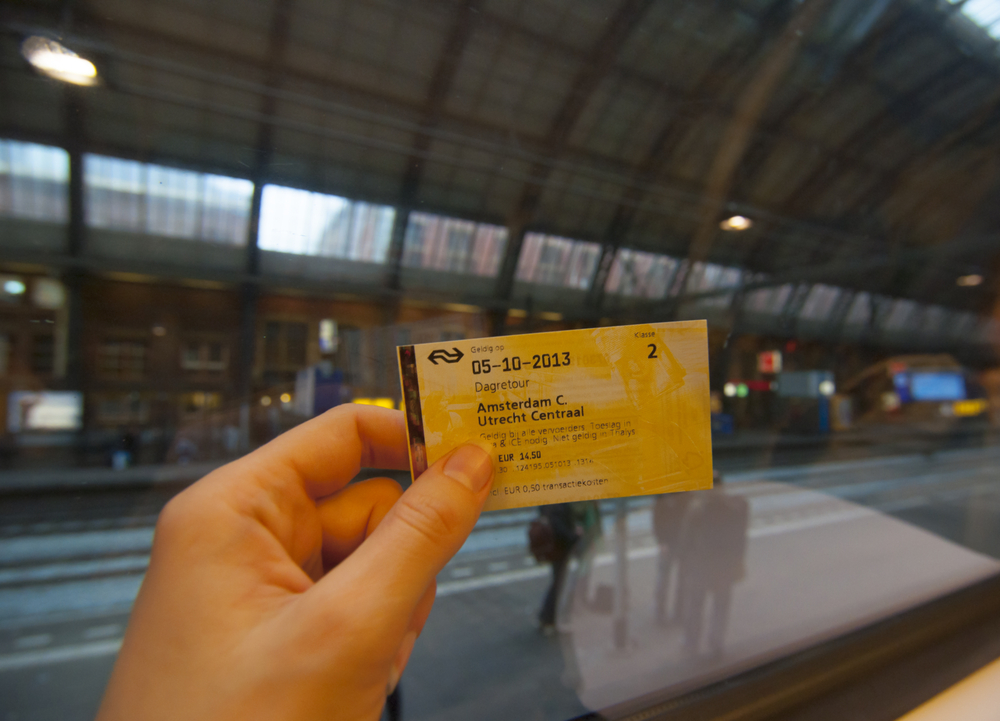
Trains in the Netherlands: your ticket will be checked
There is a strong chance that you will be caught if you don’t have a valid ticket. Almost every time I take a train in the Netherlands, my OV card or ticket is checked.
And nope, there are no exceptions made if you’re a tourist and were confused about how the trains in the Netherlands work: you will be fined if you don’t have a valid ticket.
Fines are usually €50, which is quite a chunk of money for anyone. You will spot the train conductors in advance, as they do not wear casual clothes but rather the uniform of the NS (navy and red).
What is an OV chipkaart?
An OV chipkaart measures how far you travel and charges you based on that — eliminating the need for you to buy a ticket for every journey. Now, in order for this to work, you need to check in and check out at the beginning and end of every journey.
Some stations have barriers that physically remind you of this requirement, but others — especially smaller ones — do not. Even if there is no barrier, you still absolutely have to check in and out.
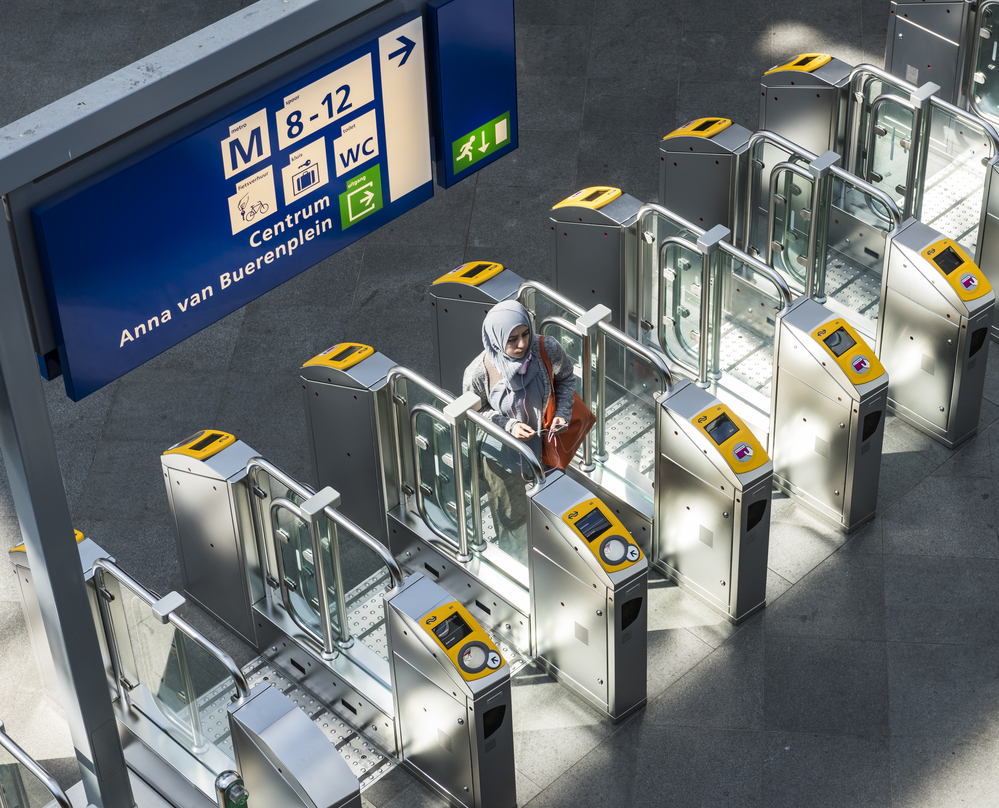
What happens if you check in but forget to check out?
If you don’t check out, you’ll be charged €10 automatically — a pretty pricey mistake.
You can get this money back by going to an OV store in the larger stations or requesting a refund online, but that’s a bit of a mission — so it’s much better to get into the habit of checking in and checking out automatically.
I taught myself to do this by simply always having my OV chipkaart in my hand. You can’t forget to check out with the card in your hand reminding you — or at least, doing this will reduce the frequency of the mistake happening.
The most annoying part of taking a train in the Netherlands: the €20 limit on your OV chipkaart
If I had to name the most annoying part of taking a train in the Netherlands, this would be it. If you’re using an OV chipkaart, the balance on your card needs to be at least €20 before you can step on board a train.
Thankfully, for trams and buses which you access with the same card, the necessary balance is a lot lower, just €4. The idea behind this rule is that you’ll never end up checking out at the other end of your journey with a negative balance on your OV card.
That seems reasonable, right? Well, yes — except if you’re doing a ten-minute commute from Leiden to The Hague every day, and EVERY DAY you have to bring your balance back up to €20, even though the journey costs less than €4. It’s frustrating, to say the least. But there’s a solution: a personal OV chipkaart!
What is a personal OV chipkaart?
If you’re living in the Netherlands long enough to have a fixed address, then you should absolutely invest in a personal OV chipkaart.
You have to request this from ovchipkaart.nl. The card will have your name, date of birth and picture on it. There are two massive advantages to having this sort of card. Firstly, you can eliminate the topping-up fiasco as it can be linked to your bank account. Every time your card needs a top-up, it happens automatically. Brilliant!
The second advantage of having a personal OV is that you can buy an annual discount. For €50 or thereabouts, you can nab a 40% discount on train travel outside of rush hour. If you’re going somewhere by train more than twice a week, this discount is a must. This has been so worth it for me as a frequent traveller.
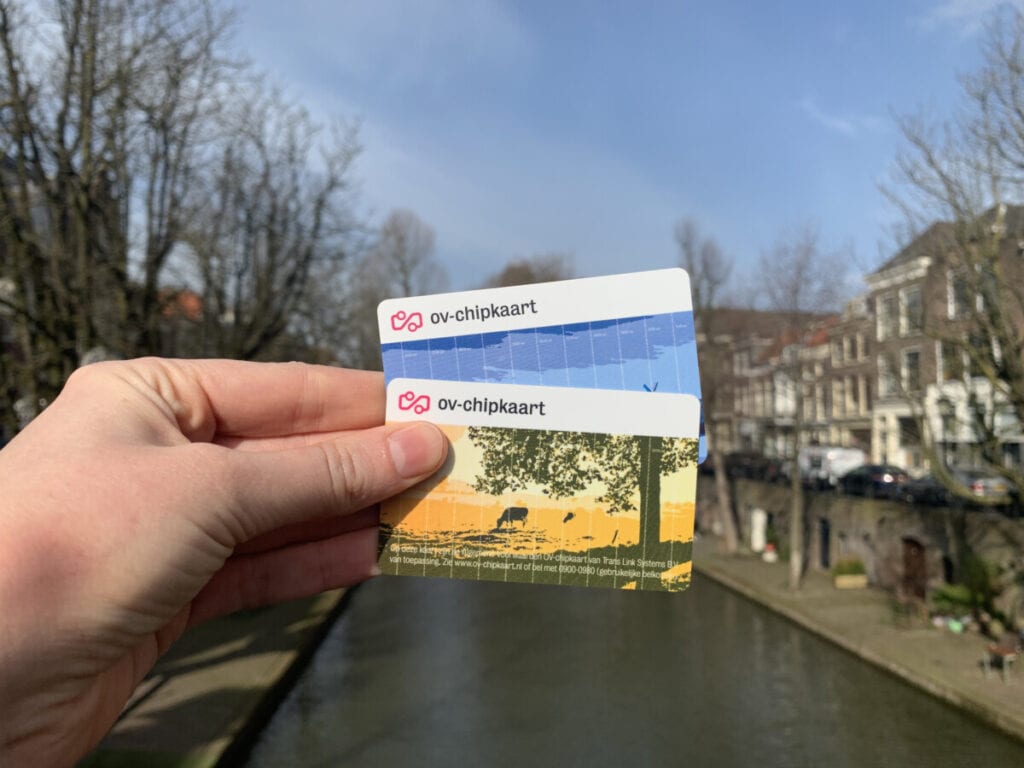
Rush hour: when not to take a train in the Netherlands
Rush hour in the Netherlands occurs each morning between 6:30 and 9:00 AM and every evening between 4:00 and 6:30 PM. Basically, the times when everyone working a job with regular hours will want to commute. It makes sense, but it’s a pain to pay those extra few euros when you want to travel at a convenient time.
How do I find out where I’m going?
Figuring out which train you need to take is always a struggle in the beginning. If you’re here for a short amount of time, I would recommend using the NS app or website.
It’ll show you the fastest route to your destination at the time you want to leave and will also tell you which platform the train is departing from. So you won’t need to stare at screens in confusion for 20 minutes — by which time you’ve missed the train you wanted to take in the first place.
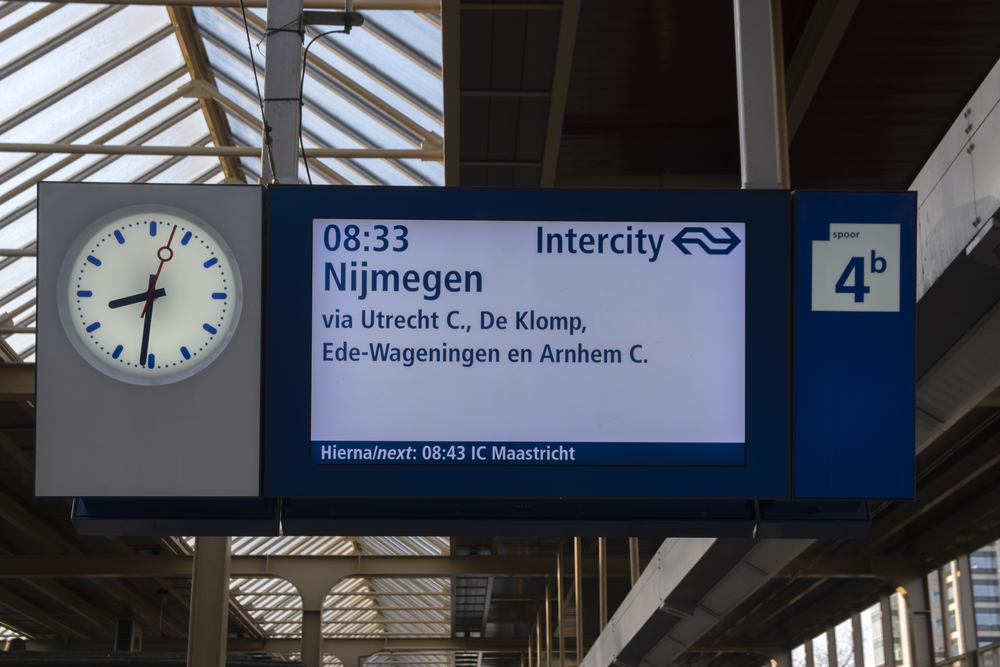
But, if you do want to do it the old-fashioned way — the screens showing train departures are, of course, your best bet.
These will display the time of departure, the number of minutes until the train leaves the platform, as well as the final destination of the train in question.
If you’re heading to a place that is not the final destination — for example, if you’re travelling from The Hague to Leiden — then you need to look at the smaller writing underneath the final destination, which will list all the stops the train will make on its journey. And, of course, you can always just ask the information desk: they’re always happy to help lost and confused tourists.
Cheaper options for taking a train in the Netherlands
Trains in the Netherlands are expensive, there’s no doubt about it. Although, there are some ways to make it cheaper for yourself. The main ones are buying a day ticket (dagkaart), especially when they’re on sale — travelling anywhere in the Netherlands for €15 is a pretty good deal.
These tickets are available at Kruidvat usually, but they do sell out pretty fast. Otherwise, try to travel with a Dutchie who has a discount card — they can transfer their 40 % discount to you if you travel together. Other good options include travelling with a group.
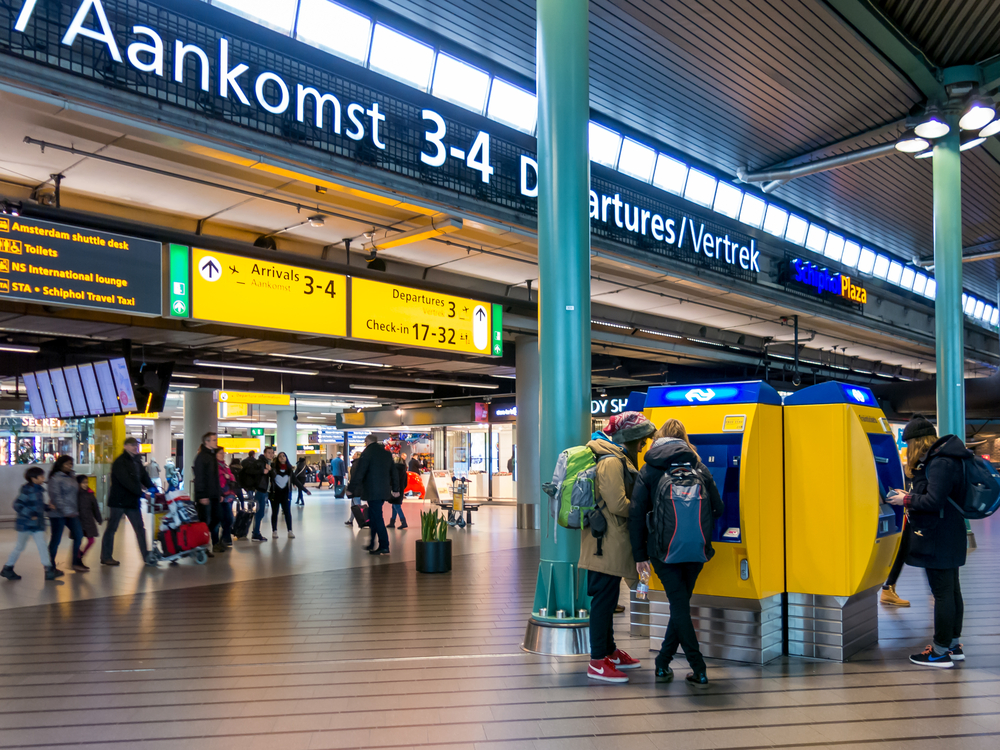
What is this NS that everyone keeps talking about?
If you’re taking the train in the Netherlands, it’s pretty much inevitable that you’ll hear these two letters: NS. In fact, I’ve used the name of the Dutch railway operation company several times already in this article. The NS is the company that runs the trains in the Netherlands, to put it simply.
They’ve made some pretty cool innovations in recent years, including beginning to test self-driving trains. They’re also almost always on time, despite how often Dutchies complain about them.
Did we leave out any important tips for taking a train in the Netherlands? Tell us in the comments below!
Editor’s Note: This article was originally written in January 2020, and was fully updated in August 2022 for your reading pleasure.





”You will spot the train conductors in advance, as they do not wear casual clothes, but rather the uniform of the NS (red and navy)”
This is not correct. I’ve been checked by plain clothes ticket inspectors several times, most recently this very evening during the peak hour (Ams-Schiphol route). Guy wore blue jeans and a sweatshirt, his female partner had a bomber jacket.
You forgot to mention that there are multiple companies that operate on the Dutch railways. When you for example change from the NS to Blauwnet (another operator). You need check out, at a NS pole and then check-in at a blauwnet pole. Although the poles are next to each other I find this the most annoying thing about the Dutch trains. The NS app will display if you need to check out and check in. Also don’t forget the OV-fiets (bike) which you can rent at a lot of train stations for just 3,85. You do however need a personal transport card.
I’ve visited several times and never knew about checking in or validating my ticket. Could it be that I bought it at the counter already validated? It’s also important to know what class ticket you bought so you know what car you can board, correct?
Can u break your journey for few hours and continue with same ticket?
Yes 🙂
With a personal card you are able to rent a bike at the station: great for city trips!
I bought a first class ticket, how do I know which car is first class? Also, do I take my suitcase to my seat with me?
Hi Beth! The numbers 1 and 2 are plastered on the outside of all NS trains and you can see the numbers 1 and 2 on plaques inside each car to indicate first or second class seats 🙂 You can take your suitcase to your seat and you can also stow your suitcases above the seats if it’s small enough.
I’ve been looking for information as to why our day return tickets this afternoon were valid to get on the train back to our hostel, but invalid when we got to our destination. My family and I couldn’t get out of the station with our tickets! There were no NS employees that we could find to help us and we ended up sneaking out.
I would like to know why there are no trains from Venlo to Dusseldorf on Sunday 13th August 2023 until after 10.00pm. Why this level of Sunday Service?
I see that the e-tickets require a name. From the machine is that needed, or is it just who holds the ticket? I ask because we don’t have a finalised list of who will be travelling until possibly the morning we go to Amsterdam from Rotterdam.
Let’s just take a second to talk about “tap in and tap out”. The readers are SUPPOSED to be able to read your card. They don’t always and IT SUCKS!!! There is NO option to swipe your card. Also you have to pay to relieve yourself. That is IF the dumb ass reader will read your card. It is a mostly good system that SUCKS BADLY when these readers don’t detect your card. It’s a fail for me.
We will be traveling from Amsterdam to Rotterdam in a few weeks by train to catch our cruise ship. We (3 of us) will each have a large suit case and a carry on. Is there plenty of space on these trains to stow our luggage during the journey? Do we need to do First class for more room. It’s the only time we will be using the train system while there.